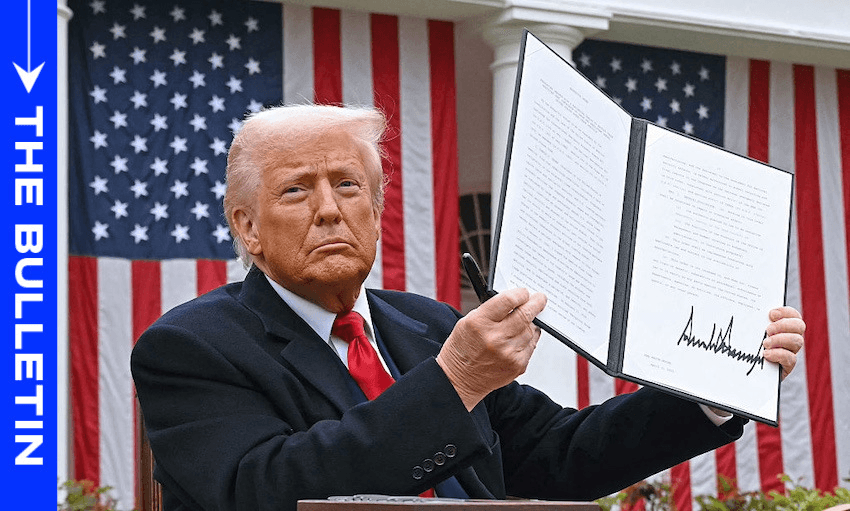We may have got off comparatively lightly, but the global blast radius will impact NZ exporters and investors alike, writes Catherine McGregor in today’s extract from The Bulletin.
To receive The Bulletin in full each weekday, sign up here.
‘Not the worst outcome in the world’
In what he grandly declared “Liberation Day” and a “declaration of economic independence,” President Donald Trump yesterday lobbed a 10% tariff at all goods imported from New Zealand – liberating local exporters, presumably, from the burden of price competitiveness in their second-largest market. The levy, part of a sweeping global package, is set to impact key industries including dairy, wine and meat, although at this stage it’s not certain how much. There’s also confusion over whether the 10% will sit on top of existing tariffs or replace them, with the executive order stating it is “additional to current tariffs” but trade minister Todd McClay saying the correct figure is still unclear.
Despite the uncertainty, McClay framed the outcome as relatively favourable, noting that “every country in the world faces a minimum of 10%”, reports Dan Brunskill at Interest.co.nz. Sense Partners economist John Ballingall agreed, calling the NZ tariff “not the worst outcome in the world” but warning that “some of the tariffs that he’s imposing on other countries are absolutely enormous, and that points to a pretty significant impact on global growth”.
AUT economics professor Niven Winchester goes so far as to suggest that New Zealand may even benefit from the trade war. According to his modelling published in The Conversation, if all nations imposed equivalent retaliatory tariffs on the US, New Zealand households would be “better off by $397 per year”.
The mystery 20% claim
Adding to the complexity is the Trump administration’s assertion that New Zealand imposes a 20% tariff on US goods – a figure McClay has pointed out is incorrect. New Zealand’s average tariff rate is just 1.9%, and even with GST included, it only reaches 17%.
The erroneous figure seems to stem from a crude calculation used by the Trump team to come up with the tariffs they claim each country levies on the US. On X, US journalist James Surowiecki was among the first to notice that “they didn’t actually calculate tariff rates + non-tariff barriers, as they say they did. Instead, they just took our trade deficit with that country and divided it by the country’s exports to us.” Newsroom’s Sam Sachdeva confirmed the math lines up: the 2024 US deficit with New Zealand was $1.1 billion, with $5.6 billion in NZ exports – yielding 19.6%, almost bang on Trump’s figure. As The Post’s Luke Malpass succinctly put it, “The numbers they are using – like an awful lot of what the president says – look like bullshit.”
No retaliation from NZ
New Zealand has no plans to implement tariffs on the US in retaliation, prime minister Christopher Luxon said, adding that escalating a trade war is “not good for New Zealand, it’s not good for the world”. This diplomatic restraint stands in contrast to the more assertive responses from other countries. European Commission president Ursula von der Leyen announced the EU is “preparing for further countermeasures” to protect its economic interests, while China, Japan and South Korea have reportedly put aside their deep-rooted mutual animosity to work on a joint retaliation strategy. Australian prime minister Anthony Albanese has also ruled out retaliatory tariffs, but others, like Canada’s Mark Carney, have vowed to act with “purpose and with force” in responding to Trump’s moves.
Stock market tanking
US stock markets have plunged overnight, with both the S&P and Nasdaq experiencing their worst trading days since September. The Dow Jones is also severely down, and all three indexes are on track to have their worst day since the inflation crisis of 2022, CNN reports. Global markets are likewise reeling on the back of fears that backlash from trading partners of the US will take down the global economy. The US dollar is at its weakest level since October. In theory tariffs should boost the dollar, but traders are betting that the “United States is creating a self-inflicted wound that would stymie its long-term growth”, CNN says. “They’re ignoring every rule of classic micro and macro economics. This is the policymaking equivalent of a suicide bomber,” market strategist Michael Block told CNN.
